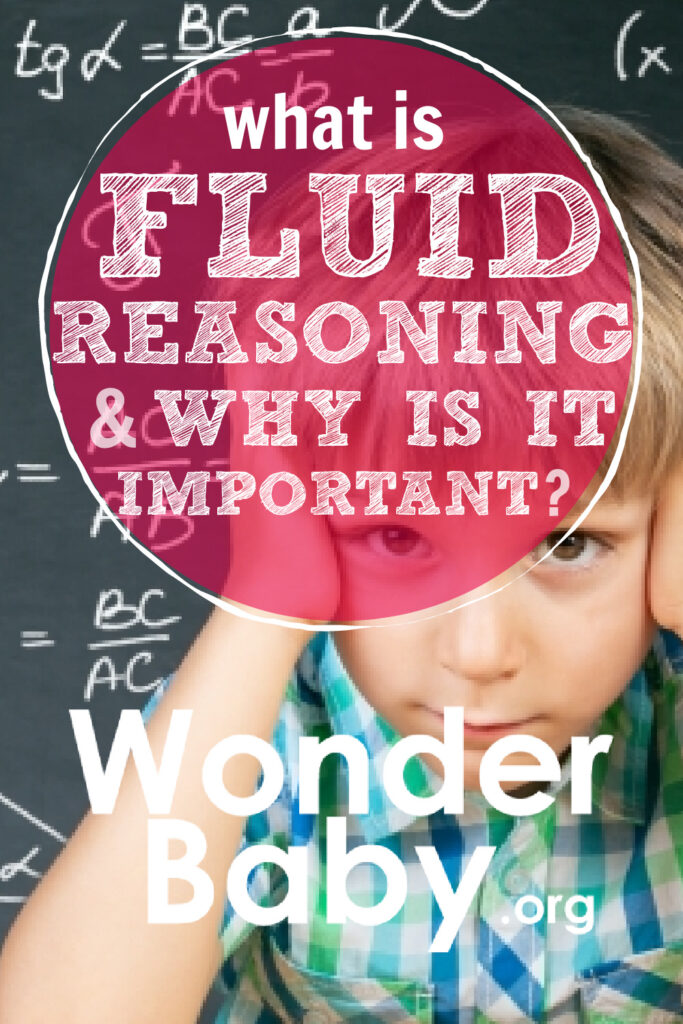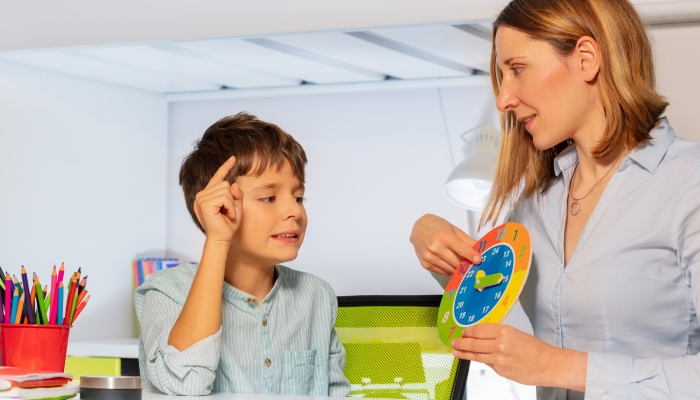What Is Fluid Reasoning and Why Is It Important?

- Fluid reasoning is the ability to think flexibly and solve problems in new situations.
- It’s an important component of cognition that rapidly develops during childhood.
- Fluid reasoning can influence performance in academics and careers.
- Some activities can help improve and develop fluid reasoning.
Does your child get stuck when working on a new puzzle? Or shy away from puzzles or new games? Does your child get easily frustrated when attempting something new?
Maybe your child refuses offers of help or suggestions when struggling with a new task.
When a child is struggling with learning new ways to do things, they may have poor fluid reasoning skills.
Fluid reasoning is the brain’s ability to think flexibly and solve problems in new situations.
Fluid reasoning is considered an essential component of cognitive development. If you’re concerned that your child has poor fluid reasoning, different activities and strategies for teaching new skills can help improve this important cognitive skill.
What Is Fluid Reasoning?
Fluid Reasoning (FR), also called fluid intelligence, is the ability to think logically and solve a new problem without using previous knowledge or skills. FR is the foundation for how a child learns new things and masters new skills.
Fluid reasoning is considered an essential part of human cognition. Fluid reasoning skills are believed to develop in the first 2 to 3 years of life.
In 1963, Raymond Cattell first introduced the concept of fluid intelligence when he published the theory of fluid and crystallized intelligence. Cattell’s theory introduced the concept of intelligence into two separate categories: crystallized intelligence and fluid intelligence.
Crystallized intelligence, or “book smarts,” uses a recall of knowledge. Crystallized intelligence builds upon previously learned concepts. As a child builds complex skills, those skills and abilities are attached to particular regions of the brain and then become hardened—or “crystallized”—skills.
Fluid intelligence is considered “fluid” because it’s not based on concepts that build up over time. FR uses no background knowledge. An individual with a higher level of FR typically likes challenges, is a creative problem solver, and has the ability to think flexibly.

Is Fluid Reasoning The Same as IQ?
Fluid reasoning, or fluid intelligence, is a component of IQ and is measured with IQ tests. IQ is measured by reasoning ability, cognitive skill, working memory, attention, and planning. Fluid and crystallized intelligence are both components of IQ.
While there are several scales to measure intelligence, there are two common IQ measurement tools for FR.
The Fluid Reasoning Index (FRI)
The Fluid Reasoning Index (FRI) is used to assess and measure a child’s general thinking and reasoning skills. The FRI is one of the five parts of the Wechsler intelligence scale (WISC-V). The WISC-V measures cognitive abilities and is commonly used for children ages 6 to 16.
The Raven’s Progressive Matrices Test (RPM)
The most widely used test for fluid reasoning is Raven’s progressive matrices test (RPM). This IQ test assesses general intelligence and can be administered to those ages 5 and up. The test includes several multiple-choice questions that focus on fluid intelligence tasks. In each question, individuals complete a pattern by identifying the missing item in the matrix.
Examples of Fluid Reasoning
Reasoning uses strategies and quick thinking for new situations while crystallized intelligence uses what you already know. When faced with a problem you’ve never come across before, fluid intelligence gives you the ability to solve it.
Examples of fluid reasoning include:
- Playing a new game or solving a new puzzle, like Kanoodle or a Rubik’s cube.
- Seeing patterns in statistical data.
- Getting lost in an unfamiliar place and having to find your way around.
- Solving math or science problems with a new procedure.
- Creating strategies to handle new problems.
Individuals that have poor fluid reasoning may:
- Struggle to recognize patterns and relationships.
- May not understand the consequences of an action.
- Struggle to draw conclusions from the presented information.
- Have difficulty transferring skills or knowledge from one concept to a new one.

Conditions That Can Affect Fluid Reasoning
Fluid intelligence tends to grow rapidly early in life due to the significant cognitive development of the brain. Cognitive developmental delays may impact the development of fluid intelligence in childhood.
Crystallized intelligence grows through adolescence, into adulthood, and later in life.
Genetics, environmental factors, and deficits in other cognitive abilities can affect fluid reasoning abilities.
Working Memory Deficits
Working memory is the ability to temporarily hold information and use it in the execution of cognitive tasks. Working memory, also referred to as short-term memory, is considered an important contributor to fluid reasoning. A person’s fluid intelligence increases with working memory capacity.
Anxiety
Individuals with anxiety sometimes have poor fluid reasoning. Learning something new may be intimidating and an individual with anxiety may avoid new situations that increase fluid reasoning ability. Cognitive distortions for kids, or anxious thoughts, can also impact their willingness to try new things. Fluid intelligence can get better once an individual learns healthy coping techniques to treat anxiety.
Autism
Those with autism tend to score higher on the RPM versus the WISC-V. A 2015 study found that individuals with autism have atypical reasoning skills and use more visual perception and less verbal processing. Fluid intelligence for individuals with autism is not dysfunctional but is better identified with visual objects.
Attention Deficit Hyperactivity Disorder
People with attention deficit hyperactivity disorder (ADHD) may have fluid reasoning difficulties. According to one study, deficits in fluid reasoning for those with ADHD may be related to cognition and behavior deficits associated with ADHD.
Dyslexia
Dyslexia is a learning disorder that causes reading difficulties. Some people with dyslexia have advanced fluid reasoning and are considered creative problem solvers. Using this strength can guide how to help teach children with dyslexia. Some individuals with dyslexia have deficits in fluid intelligence and typically have more problems with comprehension.
How Important is Fluid Reasoning?
Fluid intelligence is an important component of human intelligence. Fluid reasoning with children is one of the main indicators of academic knowledge. According to another study, fluid intelligence accurately predicts performance in academics and cognitively demanding occupations.
Fluid reasoning influences how kids learn tasks that require complex spatial, numerical, and conceptual skills. FR helps improve a child’s ability to think outside of the box, analyze situations, and solve problems.
Fluid reasoning is believed to rapidly develop during the early years of life. Children are continually exploring new environments and interacting with new things.

Tips to Help Improve and Develop Fluid Reasoning Skills
Healthy routines and practicing different skills can help improve and develop fluid and crystallized intelligence.
Healthy Routines
Focusing on healthy eating, exercise and adequate sleep will improve overall brain health and functioning. Ensure your child is getting enough sleep. Offer activities during the day for physical exercise and movement. Additionally, provide a variety of healthy foods for your child to enjoy.
Try New Things
Offer new activities for your child to help improve fluid reasoning. For young children, introduce new ways to build with blocks or a new game like Memory. As your child grows, introduce games that involve more critical thinking skills, like Kanoodle, a Rubik’s cube, or chess.
Learning a new instrument or a new language can also help develop fluid reasoning.
Immerse yourself, or your child in an unfamiliar environment. Encourage your child to try a new hobby, a new club, or travel somewhere new together. If your child is hesitant to explore new places without you or you have a clingy toddler, find ways to encourage them to explore without you.
Teach New Things with Steps
Children with poor fluid intelligence struggle to understand patterns and sequential actions. Provide more step-by-step instructions to help children connect sequences and patterns.
For example, you can:
- Sing songs or read books that have repetition.
- Describe patterns in behavior, such as a morning routine.
- Create patterns and have your child copy it.
- Use sequencing words: first, second, next, before, after, etc.
- Discuss similarities and differences with toys, household objects, people, etc.
Create New Challenges
When your child has mastered a skill, focus on a new challenge, or harder skill. When the brain masters a skill it stops working as hard. The brain needs to be challenged a little to work hard. Allow your child to struggle with a new task. The struggle increases your child’s ability to learn.
Model Fluid Reasoning in Action
When faced with a new task, model your problem-solving strategies. Think out loud near your child.
For example, if navigating a new park you may say, “I’ve never been here before. I’m not sure where the bathrooms are, but I’m going to try and figure it out. First, I’m going to open my map. Next, I’m going to look around for clues around me to try and figure out my place on the map. Then I’m going to use my finger to follow the trail to find the bathroom. Then I’m going to look for signs to see if we are going the correct way.”
When to Seek Help
If you’re concerned that your child has poor fluid reasoning, it can be helpful to get your child tested by a psychologist.
Since fluid reasoning can be impacted by mental health concerns and academic concerns, a psychologist will administer several different assessment tools to get a clear picture of your child’s unique strengths and needs.
If you believe your child is struggling with fluid reasoning due to anxiety or depression, seek the support of a mental health therapist. Together, the mental health therapist and child will learn healthy coping skills to reduce anxiety and increase your child’s willingness to participate in new things.
Although fluid intelligence peaks around age 20, focusing on the activities above will not only improve reasoning skills for your children but can also strengthen your brain too.

Related Posts

Development, Special Needs
How to Track Milestones for Developmentally Delayed Babies
Parents of developmentally delayed babies can explore practical tools and strategies to track milestones, celebrate progress, and support their child’s unique developmental journey.

Autism
Developing Time Management Skills in Children with Autism: 7 Tips
Learn how you can use structure and visual aids to help your child with autism learn time management skills.

Autism
Occupational Therapy for Children with Autism: How It Can Make a Difference
Children with autism face challenges in many different areas. Occupational therapy can help children address these difficulties while having fun!